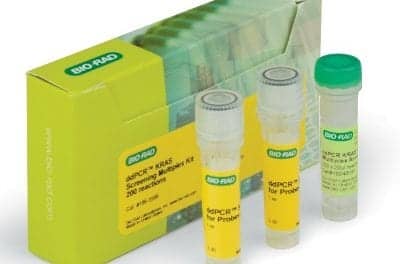Next-generation sequencing is at the forefront of the precision medicine revolution, offering the promise to empower tailored patient care.
By Luca Quagliata, PhD, BCMAS
In recent years, the field of oncology has experienced significant advances, particularly in precision medicine. The rise of new targeted treatments has expanded the number of patients who are eligible for alternative therapies. Recent data highlight that between 2017 and 2022, tumors with identifiable predictive biomarkers for therapy response rose from 8.9% to 31.6%, respectively.[i] However, a pressing issue remains: Despite 31.6% of patients having tumors with actionable alterations, only about half of them achieve a meaningful clinical response, as measured by the objective response rate (ORR). This discrepancy underscores an essential area for further development in precision medicine, especially considering the expected influx of new drug introductions over the next five years. To prepare for these advancements, we need to make sure that all eligible patients are duly testing for genomic profiling, and that no patient is left behind.
By understanding the genetic basis of a patient’s cancer, oncologists can identify the most effective treatment strategies. Next-generation sequencing (NGS) is a cornerstone of this new paradigm shift. However, a growing body of evidence is now indicating a significant gap between the potential of precision medicine and its actual implementation in clinical practice. This lag not only compromises patient care by potentially withholding optimal treatment options but also incurs economic costs through inefficient use of clinical resources and medications.
It is crucial to bridge this gap and improve the integration of NGS into clinical practice. By enhancing the availability and speed of genomic testing in clinical laboratories, we can transform cancer care. Bringing molecular testing in-house and closer to a patient’s bedside facilitates quicker genomic profiling and access to relevant targeted therapies, ultimately helping improve clinical outcomes and thus helping to unlock the full potential of precision medicine.
The Current State of Genomic Testing
To fully utilize the potential of advanced therapies, it’s crucial for clinical care teams to have a comprehensive and precise understanding of a patient’s actionable genomic profile, which encompasses all clinically significant biomarkers. Historically, the process of sequential single-gene testing was the standard method for obtaining this information. However, as the number and the complexity of clinically significant biomarkers continue to increase, NGS has rapidly emerged as a superior approach, offering several distinct benefits that enhance the efficiency of genomic analysis.
NGS outperforms the traditional sequential single-gene testing by providing a more thorough overview of a patient’s genetic makeup. Notably, it does so while requiring smaller tissue samples and delivering quicker results. These attributes, coupled with the sharp level of automation inherent to certain NGS technological approaches, render it especially suitable for use in community hospitals and local laboratories, bringing this advanced capability closer to patients.[ii]
While the advantages of NGS are evident, several significant barriers hinder patient access to genomic sequencing and the full realization of its benefits. Key among these are the limited familiarity and confidence among physicians regarding these technologies, coupled with the slow pace at which genomic testing is being covered by commercial insurance providers. Additionally, various gaps in clinical practice hinder the widespread adoption of NGS testing. These range from basic errors, such as not ordering the correct genomic tests, to a broader lack of awareness about FDA-approved applications, the shortage of adequately trained laboratory staff, the occurrence of inconclusive test results, extended turnaround times, and limited availability of in-house genetic testing capabilities.[iii]
However, it’s important to note that these challenges are surmountable. Overcoming them requires a concerted effort involving time, resources, and commitment. By addressing these issues, the healthcare sector can unlock the full potential of NGS in enhancing oncology patient care, leading to more personalized and effective treatment strategies.[iv]
Delays in Turnaround Time Hurt Precision Medicine Potential
Even if hospitals now recognize the benefits of NGS, they must ensure to have access to the test results quickly to inform action. Centralized send-out genomic testing is currently the prevalent model in the U.S., but it can take weeks to return results, so even if testing is done, the results may not be available to inform care decisions.
In this case, even when the proper tests are ordered, delays in turnaround time mean that urgent treatment decisions may be hindered or must be made without these insights available. Due to these delays, patients might receive less effective treatments, missing out on more targeted precision medicine options that could have been identified with earlier access to their genomic data. Bringing NGS diagnostic solutions in-house can significantly mitigate this issue, providing pathologists and oncologists the ability to inform care from the beginning of a patient’s medical journey.[v]
A real-world data study published in JCO Oncology Practice underscores the importance of obtaining genomic testing results before initiating treatment.[vi] Patients with non-small cell lung cancer (NSCLC) who received genomic testing prior to treatment exhibited significantly better outcomes than those who did not. These findings reinforce the importance of molecular testing through rapid NGS as a critical first step in determining the best course of treatment for cancer patients and ultimately enhancing survival rates.
Democratizing NGS access and integrating it into more laboratories can streamline the delivery of genomic testing results. Advances in automated equipment are lowering the barriers for lab staff training, making in-house testing more feasible and reducing result turnaround times to as little as 24 hours. This shift towards quicker, more accessible genomic testing represents a significant advancement in patient care toward the realization of a precision medicine paradigm, allowing healthcare providers to make more informed and effective treatment decisions.
Advancing In-House Adoption Through Rapid NGS
While the benefits of rapid and accessible sequencing are clear, the in-house implementation of such technology has progressed more slowly than anticipated. Oncologists and pathologists are key in driving the adoption of in-house NGS solutions, which is essential for enhancing patient outcomes in the future. Thermo Fisher’s Ion Torrent Genexus*, research use only system, has lowered the barrier to exploration of in-house NGS by offering a fully automated, end-to-end workflow.[vii] This system simplifies the entire testing process, requiring less extensive training, accommodating lower sample input, and delivering exceptionally quick results.
As NGS becomes increasingly user-friendly, more laboratories will be equipped to conduct in-house testing, ensuring that, in the future, patients receive the most suitable therapies right from the start of their treatment journey.[viii] As they fully leverage the potential of genomic testing, oncologists and pathologists need to continue to stay abreast on molecular testing options, while educating their teams and patients about the benefits of comprehensive biomarker testing. It is reassuring to see that substantial effort has been poured into this topic by the leading medical associations. The continued collaboration between oncologists and pathologists can create vital synergies to drive the molecular revolution, with pathologists using their expertise in tissue handling and processing to complement genomic testing technology. This collaborative approach empowers oncologists to make more informed precision medicine treatment decisions and anticipate future tumor developments, including risk of relapse.[ix]
Stepping into the Future of Precision Medicine
Next-generation sequencing is at the forefront of the precision medicine revolution, offering the promise to empower tailored patient care. Yet, the journey from this promise to practical clinical application is challenged by factors such as slow adoption, limited access, and long turnaround times to results. By embracing automated solutions and promoting in-house NGS adoption, healthcare providers can bridge this gap and ensure that patients receive the right therapies at the right time.
With a collaborative effort from oncologists, pathologists, and the broader medical community, we can unlock the full potential of genomic testing, providing hope and improved outcomes for cancer patients worldwide. We can also embrace fields like transcriptomics and proteomics as the next big challenge. By gaining more in-depth insights into these fields, we can refine our approach to select the most effective treatments and tailor dosing strategies more precisely. Such progress would significantly enhance the effectiveness and customization of patient care.
*Ion Torrent Genexus System is currently For Research Use Only, not for use in diagnostic procedures.
ABOUT THE AUTHOR

Luca Quagliata, PhD, BCMAS, is vice president and global head of Medical Affairs for Clinical Sequencing and Oncology at Thermo Fisher Scientific, where he works to advance Precision Medicine through cutting-edge sequencing technology and solutions for research and clinical applications. Before joining Thermo Fisher, he worked as senior director for the R&D Unit as well as leader of the molecular diagnostics team at the Institute of Medical Genetics and Pathology, care of the University Hospital Basel, Switzerland. Luca also served as a faculty member and was responsible for the Molecular Pathology curricula for the CAS – Certificate of Advanced Study in Personalized Molecular Oncology at the Faculty of Medicine, University of Basel.
REFERENCES
[i] Suehnholz, S. P., et al. (2023). Quantifying the expanding landscape of clinical actionability for patients with cancer. Cancer Discovery. https://doi.org/10.1158/2159-8290.cd-23-0467
[ii] Arriola E. et al. (2023) Cost-Effectiveness of Next-Generation Sequencing Versus Single-Gene Testing for the Molecular Diagnosis of Patients With Metastatic Non-Small-Cell Lung Cancer From the Perspective of Spanish Reference Centers. JCO Precis Oncol. 2023 Mar;7:e2200546. doi: 10.1200/PO.22.00546. PMID: 36862967; PMCID: PMC10309530
[iii] Sadik H, Pritchard D, Keeling DM, Policht F, Riccelli P, Stone G, Finkel K, Schreier J, Munksted S. Impact of Clinical Practice Gaps on the Implementation of Personalized Medicine in Advanced Non-Small-Cell Lung Cancer. JCO Precis Oncol. 2022 Oct;6:e2200246. doi: 10.1200/PO.22.00246. PMID: 36315914; PMCID: PMC9666118
[iv] Dagogo-Jack I et al. JCO Oncol Pract 2023 (doi:10.1200/OP.23.00031).
[v] Sheffield BS, Beharry A, Diep J, Perdrizet K, Iafolla MAJ, Raskin W, Dudani S, Brett MA, Starova B, Olsen B, Cheema PK. Point of Care Molecular Testing: Community-Based Rapid Next-Generation Sequencing to Support Cancer Care. Curr Oncol. 2022 Feb 23;29(3):1326-1334. doi: 10.3390/curroncol29030113. PMID: 35323313; PMCID: PMC8947443.
[vi] Scott J et al. Compromised Outcomes in Stage IV Non–Small-Cell Lung Cancer With Actionable Mutations Initially Treated Without Tyrosine Kinase Inhibitors: A Retrospective Analysis of Real-World Data. JCO Oncology Practice. 2023 Aug; DOI: 10.1200/OP.22.00611
[vii] Thermo Fisher Scientific, “Fast, easy, automated end-to-end next-generation sequencing workflow that delivers NGS test results in as little as 24 hours,” https://www.thermofisher.com/us/en/home/life-science/sequencing/next-generation-sequencing/ion-torrent-next-generation-sequencing-workflow/ion-torrent-next-generation-sequencing-run-sequence/ion-torrent-genexus-system.html
[viii] Sheffield BS, Beharry A, Diep J, Perdrizet K, Iafolla MAJ, Raskin W, Dudani S, Brett MA, Starova B, Olsen B, Cheema PK. Point of Care Molecular Testing: Community-Based Rapid Next-Generation Sequencing to Support Cancer Care. Curr Oncol. 2022 Feb 23;29(3):1326-1334. doi: 10.3390/curroncol29030113. PMID: 35323313; PMCID: PMC8947443
[ix] Dagogo-Jack I et al. JCO Oncol Pract 2023 (doi:10.1200/OP.23.00031).





